philosophy as a way of life, metaphilosophy by Matthew J Sharpe
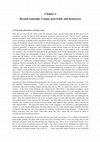
Why Camus Matters, 2025
-- unformatted author's draft chapter of 2025-26 book, Why Camus Matters (Bloomsbury), on "post-t... more -- unformatted author's draft chapter of 2025-26 book, Why Camus Matters (Bloomsbury), on "post-truth". Politically, I argue that post-truth is not a metaphysically deep notion, but a political strategy to muddy the epistemic waters and normalise forms of cynicism and misinformation, whose flipside is conspiratorial "hyper-truth"-people who believe too strongly in the truth of poorly supported, politically-divisive "narratives". The chapter shows that Camus' postwar writings, including his reflections and activities as a journalist, anticipate today's post-truth" situation: what he called a mediatic world of "polemic and insult". His philosophical defence of post-metaphysical human solidarity however supports a principled opposition to the kinds of misinformation on which authoritarianisms thrive, defending a "right not to lie". Camus' analysis of why media collapses into sensationalism and hyper-truth argues that this reflects economic concentration, including in media ownership, of just the kind that has developed in the neoliberal era. To oppose "post-truth" will hence involve political-economic opposition to the economic settings which have engendered mass inequality, alienation and rage, since the 1970s. (But those arguments are in other chapters)
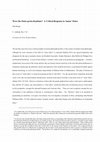
This paper will critically assess the interpretation of one modern thinker associated with later ... more This paper will critically assess the interpretation of one modern thinker associated with later modern virtue ethics who positions the Stoics as decisively what we will call “proto-Kantians”, Julia Annas. Annas’ Morality of Happiness presents the Stoics as ethical eudaimonists who, nevertheless, ask the virtuous agent to “override” or put aside their natural impulses to adopt “what is nowadays called the moral point of view”, in a way which sees her severally compare the Stoics’ position to Kant’s, not always favourably (MH 170; 410). Annas is certainly right that the Stoics stress a difference in kind between virtue as a source of benefit and well-being, and other putative “goods” (the famous “indifferents” (ta adiaphora)). The Stoics, as Annas credits, also see the motivational set of a virtuous sage as differing from the untutored natural impulses with which we all begin life as children, because of the supervening of reasoned reflection (DL VII 86) integrated into a regimen of life (Sellars 2013). But this paper proposes that to interpret these defining Stoic positions in the proto-Kantian frame which Annas constructs for them in Morality of Happiness is importantly mistaken. To make this case, Part 1 of the essay examines Annas’ reading of the Stoics as in decisive respects proto-Kantians. Part 2 provides criticisms of Annas’ two core claims: the first, that the Stoics provide no argument that does not beg the question for their conception of virtue as necessary and sufficient for happiness, but assume this “moral point of view” as an unargued datum; the second, that Stoicism accordingly asks subjects to adopt an ethical stance in which they are moved by a set of motivations which do not represent the transformation, harmonization or perfection of their natural impulses, but their over-riding or denial, in the name of the proto-Kantian moral point of view of rational consistency.

This talk, on the occasion of the launch of two newly-translated texts by Polish philosopher and ... more This talk, on the occasion of the launch of two newly-translated texts by Polish philosopher and history of philosophy, Juliusz Domanski: namely, Philosophy, Theory or Way of Life? and Erasmus and Philosophy (both, Brill 2024). Something of the history of the translation of the former work is given, seven 'chapter headings' marking its contributions to the present growing literature on philosophy as a way of life are proffered; before the larger part responds to the monumental study, Erasmus and Philosophy. The paper tries to reconstruct Domanski's sense of Erasmus' notion of philosophia Christi, and how it brings together a renewed sense of ancient philosophy as a way of life, and Erasmus' ambition to return to a Christianity as yet uncorrupted (in his view) by scholastic intellectual cultures. Then, I recount Domanski's argument that this critique of scholasticism, and recovery of ancient philosophical "practicism", is not contradicted by Erasmus' definitively humanistic cultivation and recommendation of bonae litterae (classical learning). Erasmus sees parallels in the literary forms employed by ancient philosophers, and biblical authors, whose legibility is enhanced by studies in grammar (poetics) and rhetoric--it is not intellectualism as such, but the prioritisation of dialectics in scholasticism, which is Erasmus' target. The talk closes by suggesting that Erasmus and Philosophy shows the great benefits conferred by Hadot's and Domanski's work, in remaking legible philosophers like Erasmus presently sidelined in most histories of the discipline.
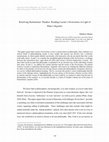
Journal of Ancient Philosophy, 2024
Lucian has often been treated as a sophist, and his most Socratic dialogue, the Hermotimus, has b... more Lucian has often been treated as a sophist, and his most Socratic dialogue, the Hermotimus, has been dismissed as a sceptical dismissal of the possibility of philosophy. This paper contends that the dialogue is a critique of dogmatic or sectarian forms of philosophy, not philosophy per se. It shows that there are five points in the dialogue wherein Lycinus presents a positive conception of philosophy as a way of approaching inquiry. Key to discerning Lucian's critical but constructive philosophical intention, the paper shows, are Lucian's clear references to the educational program in Plato's Republic VI-VII, notably the association of sectarian philosophers with the forms of inquiry characteristic of geometry: that is, unable to call into question dialectically its own first principles, which is what philosophy proper should do, up to and including the openness to admitting that we may previously have been wrong.
Draft of presentation on the Western conceptions of liberal education, and its relationship(s) wi... more Draft of presentation on the Western conceptions of liberal education, and its relationship(s) with philosophy in different models, for June 2024 conference, "Bridging Chinese and Western Perspectives: Advancing Global Liberal and Humane Higher Education" at Hangzshou Normal University. The paper suggests that, alongside Kimball's (Platonist) dialectician-philosopher/scholastics and the Isocratean orator-citizens, the Stoic-Hellenistic philosophers present a third model, which places ethical formation as the highest end.*
* Draft only for possible comment: pls email at my acu address.
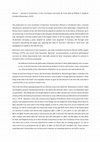
The publication of a new translation of Epictetus' Encheiridion (Manual or Handbook) with a schol... more The publication of a new translation of Epictetus' Encheiridion (Manual or Handbook) with a scholarly introduction represents by itself a real event for people interested in Stoic philosophy. Compiled by the Roman Stoic's student, Arrian, this little book has played an outsized role in the history of Stoicism, up to the present day. It was beloved already in late antiquity, amongst Neoplatonists and the Church fathers (54 [1]). Subsequent Christian authors paid it the highest tribute of all: not simply that of flattery, with the Encheiridion becoming a genre adapted by authors from Augustine to Erasmus, but through some monastics actually reproducing the pagan text, replacing the name of "Socrates" with that of "Saint Paul", and packaging it as a guide to the holy life (55). Epictetus's text's rediscovery in the renaissance saw Latin translations by Niccolo Perotti (1450), Angelo Poliziano (1479), and several later humanists. Epictetus' recommendations of practical philosophical
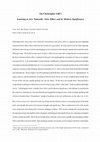
Author's draft only [ of review essay for Stoicism Today] on Christopher Gill's Learning to Live ... more Author's draft only [ of review essay for Stoicism Today] on Christopher Gill's Learning to Live Naturally: Stoic Ethics and its Modern Significance (Oxford University Press, 2023). Gill's groundbreaking book is arguably the most important scholarly book on Stoic ethics which has been written for a generation. After and including in the exhaustive reconstruction of Stoic ethics in parts 1 and 2, Learning to live Naturally is dialectical, and presents a sustained apology for Stoic ethics. It aims to establish Stoicism's credentials in dialogue with academic work on virtue ethics, as well as in the light of contemporary ecological debates. With decisive recourse to Cicero and the doxographic sources, Gill shows how Stoicism is deeply misunderstood as egoistic and unsociable. Indeed, in his reconstruction, it provides a profoundly humane, coherent ethical perspective which avoids tensions in Aristotle's position (on the happiness-virtue relationship, and relation between the theoretical-practical virtues) whilst sharing his naturalistic conception of ethics, and which can provide better responses to criticisms of virtue ethics than better-known forms of neoAristotelianism. The review examines the book's exegeses of Stoic ethics (1), Gill's presentation of Stoic ethics as a more attractive and coherent form than the regnant neoAristotelianisms (2), before closing remarks critically examine Gill's intervention in the debate surrounding Stoic naturalism, prompted by Julia Annas' work (!993).
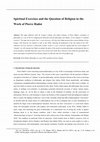
Religions, 2023
This paper [*post-print only, links to published version below] addresses John M. Cooper's critiq... more This paper [*post-print only, links to published version below] addresses John M. Cooper's critique, and related critiques, of Pierre Hadot's conception of philosophy as a way of life for collapsing the distinction between philosophy and religion, via the category of "spiritual exercises". The paper has two parts. Part 1, a pars destruens, will show how Hadot presents three cogent rebuttals of these charges, with which he was familiar as early as the 1980s, following the publication of the first edition of his 1981 collection, Exercises spirituels et philosophie antique. In part 2, a pars construens, putting aside the vexed category of "religion", we will examine how Hadot reconsiders the place of the sacred in ancient philosophy, positioning the latter as not the attempt to rationally dispel any sense of the sacred in the world, but to relocate it from within the sanctioned cultic places and temples of traditional Greco-Roman religion to within the inner life of the godlike sage.
* For published version, see <https://aus01.safelinks.protection.outlook.com/?url=https%3A%2F%2Fwww.mdpi.com%2F2077-1444%2F14%2F8%2F998&data=05%7C01%7Cmatthew.sharpe%40acu.edu.au%7C572cc1b746cc4cad7cbe08db94084afc%7C429af009f196448fae7958c212a0f2ce%7C0%7C0%7C638266535561505036%7CUnknown%7CTWFpbGZsb3d8eyJWIjoiMC4wLjAwMDAiLCJQIjoiV2luMzIiLCJBTiI6Ik1haWwiLCJXVCI6Mn0%3D%7C3000%7C%7C%7C&sdata=L1N%2B2Z0PCh2A0DZ2PiDrry%2BSLSQuu9WISI68mUADVaU%3D&reserved=0>
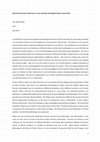
[Draft of keynote address for “Philosophy as a Way of Life in Hyper-Connected Age”22-24/7/2023, X... more [Draft of keynote address for “Philosophy as a Way of Life in Hyper-Connected Age”22-24/7/2023, Xi’an, China] This paper contends that to talk of Stoicism as a way of living with digital hyperconnectivity has to involve more than just the canny prescription of exercises ("life hacks") for addressing some of the distressed and fearful symptoms of the over-investment in others’ opinions and being prompted to endlessly compare ourselves with others, that social media usage promotes. It has to involve a fundamental reorientation of values, asking people to find their primary source of worth not in what myriad virtual others think of them, but in their own actions and intentions. From a Stoic perspective, a person need not literally unplug from all devices and internautic platforms. But they need to philosophically unplug their sense of self and worth—of what they think they need to live well—from the values effectively coded into social media, which turn the wheels in the engines of “the attention economy”, at human costs we are increasingly cognisant of. Rather than making our senses of our own selves turn upon others’ views of us, from the outside, we should let the world turn as it will, but do things which serve our communities, which foster virtues in others, and which cultivate the virtues in ourselves. And rather than supposing that online “connectivity” could ever be more than one more tool to use in service of independently conceived values, but the indispensable, inevitable means or even actualisation of excellence, happiness, flourishing, sociability, and salvation--as the hype surrounding the net suggests--Stoicism as a way of living with digital hyperconnectivity proposes a thoughtful, critical reservation (hypexairêsis).
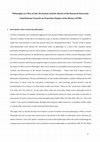
This essay takes it bearings from Hadot’s singling out of the moment of German idealism, and the ... more This essay takes it bearings from Hadot’s singling out of the moment of German idealism, and the foundation of the modern research university (first of all, that of Berlin in 1809), as especially significant in the history of the eclipses and recurrences of PWL in the West. Proffered as a draft for an as-yet-unwritten, decisive chapter on the history of PWL [to be delivered in Lisbon at "Mapping PWL" event), it closely examines the texts by Schleiermacher, Fichte, Humboldt and Schelling that Hadot mentions en passant in “Enseignement ancient et moderne de la philosophie” (Hadot 2020, 149-178; cf. 305-322). These texts represent studies of great significance for the history of PWL, the paper suggests, insofar as they are philosophical reflections on the university, its necessity and its purpose, as well as metaphilosophical reflections more specifically on philosophy, its nature and role, within the universities. In part 2, we will show how Hadot’s claim that these texts inaugurate a subordination of philosophy to the state, even in its qualified form, needs to be revised. What stands out is rather the attempt, sketched already in Kant (1794), of trying to grant philosophy a new autonomy within the modern university, as the sole faculty ideally governed by reason alone, not by external authorities. In part 3, we will critically pursue Hadot’s comments linking the advent of the modern research university with the construction of philosophy as a system. Our argument contra Hadot is that the classical idealistic texts on the university also each envisage philosophy as implicating a form of pedagogy and Bildung, and with Hadot, that this Bildung is nevertheless subordinated to the pursuit of systematic, pure, or absolute knowledge in ways which pave the way to today’s almost-unchallenged expectations around what "serious philosophy" must always be (that is, theoretical, written, publishable in peer reviewed formats). In conclusion, we proffer three observations raised by our analysis, concerning Hadot’s presentation of the idea of university philosophy as one the one hand a philosophy of civil servants, teaching other civil servants, and how it relates to the longer history of, and continuing contemporary research on, PWL.
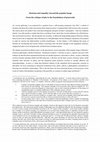
This paper [draft only for book chapter, do not cite, but pls feel free to contact with comments*... more This paper [draft only for book chapter, do not cite, but pls feel free to contact with comments*] challenges the standard image of Stoicism as a pitiless philosophy of self-perfection, enshrining what Martha Nussbaum calls a "radical detachment" from others. After examining Nussbaum's critique of the Stoics in "Pity and Mercy: Nietzsche's Stoicism" (part 1), we present the counterevidence attesting to the primacy of other-relatedness in Stoicism, in their accounts of the emotions and virtues (part 2). Part 3 presents the theoretical basis for a more adequate account of Stoic sociability, in the doctrine of oikeiosis, drawing on the work of figures led by Reydams-Shils and Johncock. On this basis, in part 4, we revisit the question of Stoicism's supposed detachment, arguing that the Stoics' devaluation of externals, to 'beneath good and evil', is carried out precisely in order to make possible more generous, sociable relations to others untroubled by such destructive affects as envy, jealousy, anger, hatred, and spite. *Feedback welcome at my email address msharpe@deakin.edu.au.
[Draft only for Stocism Today] After around a decade of unlooked-for popular growth, it may no lo... more [Draft only for Stocism Today] After around a decade of unlooked-for popular growth, it may no longer be too soon to say that we could be approaching "peak Stoic". The reader in search of practical guidebooks on "how to live like a Stoic" is faced with an embarrassment of riches. But does the focus on self-care minimize ancient Stoicism's deeply social ontology, which is foregrounded in the Hellenistic sources as well as a text like Cicero's De Finibus? Will Johncock's Beyond the individual examines this question, and seeks to recover a sense of Stoicism which doesn't exclude the practical, but which responds more completely to the ancient sources. In this way, the book proffers a needed challenge to some images of Stoicism within and outside the academy today.
Stoicism Today, 2022
Aristotle and the Stoics agree on a lot. Above all, for both, virtue is the primary thing a perso... more Aristotle and the Stoics agree on a lot. Above all, for both, virtue is the primary thing a person needs to be happy. But they also differ in key ways. Aristotle thinks external things like fame, power, money, and looks are also goods that a person will need. The Stoics disagree. Moreover, they each conceive virtue, or the virtues, differently. For Aristotle, virtue is about choosing a "mean" (meson) between extremes, in terms of the emotions we feel, and the actions we undertake. For the Stoics, it involves forms of episteme about what to select and avoid. Taking the case of courage, this short piece (draft for Stoicism Today) examines the differences, and looks at the five forms of courage Chrysippus identified in contrast to Aristotle on andreia.
Translators' commentary on Pierre Hadot's 1959 "Heidegger and Plotinus" . The original article a... more Translators' commentary on Pierre Hadot's 1959 "Heidegger and Plotinus" . The original article appeared in Critique, June 1959, as a reflective review essay by the young Hadot of recent French, English, and German-language works published at that time on Heidegger and Plotinus. The commentary examines Hadot's assessment in this piece of the comparisons, at the level of metaphilosophy, and differences, at the level of metaphilosophy, between Heidegger and Plotinus. We then examine Hadot's later article on "Being" as an infinitive in the Neoplatonic commentary on Plato's Parmenides, before turning to Hadot's reflections on the relationship between his own formative conception of philosophy, his ongoing study of competing forms of mysticism, and Heidegger's thought of Being.
Translation of Pierre Hadot's 1959 "Heidegger and Plotinus" with commentary by Matthew Sharpe & M... more Translation of Pierre Hadot's 1959 "Heidegger and Plotinus" with commentary by Matthew Sharpe & Matteo Stetter. The original article appeared in Critique, June 1959, as a reflective review essay by the young Hadot of recent French, English, and German-language works published at that time on Heidegger and Plotinus. The commentary examines Hadot's assessment in this piece of the comparisons, at the level of metaphilosophy, and differences, at the level of metaphilosophy, between Heidegger and Plotinus. We then examine Hadot's later article on "Being" as an infinitive in the Neoplatonic commentary on Plato's Parmenides, before turning to Hadot's reflections on the relationship between his own formative conception of philosophy, his ongoing study of competing forms of mysticism, and Heidegger's thought of Being.
Qeios, 2022
Review of: "Philosophy as a Way of Life as a Pathway to Recovery for Addicted Individuals"
Eidos: A Journal for Philosophy of Culture, 2022
In his magisterial Ars Erotica, a text examining "the history of erotic theory in the world’s mos... more In his magisterial Ars Erotica, a text examining "the history of erotic theory in the world’s most influential premodern cultures,” Richard Shusterman acknowledges what he owes to Michel Foucault's later works on the history of sexuality amongst the ancient Greeks and Romans, as well as his differences from Foucault’s work. This paper, by first (I) returning to History of Sexuality II, The Use of Pleasure, examines these differences (II), marking out the extent of Shusterman’s contribution, when it comes to understanding the ancient Mediterranean pagans’ experiences and discourses, surrounding sex, its practices, and its pleasures
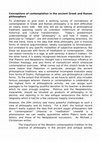
[Script of talk at Contemplative Studies Centre, Melbourne, April '22] The talks starts by stagin... more [Script of talk at Contemplative Studies Centre, Melbourne, April '22] The talks starts by staging the view that ancient philosophies could not have been “contemplative”, since we "know" today that philosophy involves forms of reasoning unrelated to such experiences. By citing just one small sample from across three philosophical schools, it calls this putative certainty into question. Then, it challenges the supposition that the Greeks and Romans’ conceptions of logismos or ratiocination must have been the same as ours, stressing the way that the philosophers saw this capacity, our most divine or godlike, as a means to “harmonise” ourselves with the larger whole, not put us at a cold, calculating distance from reality. This excursion into first philosophy provides the setting for a cultural-historical claim: that Greek and Roman philosophy did not so much break with earlier forms of culture and experience we consider “religious”, as operate a rationalizing relocation of the sacred, from external “temples” to within the soul of the seeker after wisdom. The talk will then examine how ancient philosophical contemplation was configured in relation to celebrations of the leisured life. The relationship between celebrations of such otium and specifically contemplative practices is complex. A member of the male elite could withdraw from public affairs and cultivate tranquility through forms of exercise and living which were not distinctly contemplative. At the same time, leisure was recognized as a precondition for theoria in Aristotle (and contemplation was celebrated for being the most “leisured” form of human activity). Moreover, in all of the schools, developing an understanding of physics or metaphysics--which would enable the philosopher to envisage with their mind’s eye (nous, in Plato and Aristotle) the generative principles and interconnectedness of the parts of the whole--was held to produce tranquility. Such an expanded philosophical purview relativizes our ordinary, anxiety-inducing attachments, “cleans[ing] away the mire of the terrestrial life”, as Marcus Aurelius says (Meds. VIII, 47). The paper closes by stressing the extent to which contemplative knowing represents, at its deepest level, a mode of knowing in which the knower and her activity is included in the object known, as one part or expression of the larger Whole. This is captured in the Platonist recourse to a language of love to describe philosophy or the pursuit of wisdom.
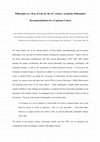
In this essay [author's draft of piece to appear in Studies in Pedagogy], sketch a third possibil... more In this essay [author's draft of piece to appear in Studies in Pedagogy], sketch a third possibility between teaching PWL solely as history of philosophy, and the fascinating recent attempts by scholars to experiment with introducing modes of teaching and assessment which would reactivate ancient spiritual exercises within the modern university. This third way takes for granted that, for the foreseeable future (and if academic philosophy widely survives in the 21st century), it will do so as a primarily theoretical discipline. Nevertheless, insights from PWL’s re-conception of philosophy as a situated, social as well as ethical activity can and ideally should be integrated into modern syllabi. This can be done by introducing and teaching capstone unit(s) for advanced students which would reflect critically on what it is to be an academic philosopher today: and the ways that philosophy is institutionalized as a professional discipline in neoliberal universities creates pressures towards particular forms of intellectual and ethical vice and sophistry. Based on a course taught at the author’s home university, it examines how Plato’s Republic, Bacon’s Novum Organum, and Kivisto’s Vices of Learning prompt students, respectively, to consider the place of the philosopher in the “city”, their own (and all our) propensities towards forms of epistemic bias and partiality, and the ways that institutionalized competition for status can promote forms of pride, vanity, and misanthropy in scholars. Encountering and discussing these texts, it is argued, can prepare students for the realities of philosophizing in the professional universities of the 21st century, helping them to identify ways philosophers can go wrong, and helping them to identify chastened, more Socratically self-aware ways of thinking, reading, arguing, and understanding what philosophers do.
Review [author's draft only--do not cite] book by Ilsetraut Hadot, in Ian Drummond's translation ... more Review [author's draft only--do not cite] book by Ilsetraut Hadot, in Ian Drummond's translation from the 2014 original, undertakes to give a summary of the state of the art in research on the life of Simplicius, his commentaries on Epictetus' Encheiridion, Aristotle's De Anima and Categories, together with Simplicius' lost texts, and the influence of his texts in the Christian, Arabic and humanistic traditions. Especial focus falls on the question of the authorship of the De Anima commentary, and the provenance of the text's account of the soul (Hadot arguing for Simplicius' debts to Damascius).









Uploads
philosophy as a way of life, metaphilosophy by Matthew J Sharpe
* Draft only for possible comment: pls email at my acu address.
* For published version, see <https://aus01.safelinks.protection.outlook.com/?url=https%3A%2F%2Fwww.mdpi.com%2F2077-1444%2F14%2F8%2F998&data=05%7C01%7Cmatthew.sharpe%40acu.edu.au%7C572cc1b746cc4cad7cbe08db94084afc%7C429af009f196448fae7958c212a0f2ce%7C0%7C0%7C638266535561505036%7CUnknown%7CTWFpbGZsb3d8eyJWIjoiMC4wLjAwMDAiLCJQIjoiV2luMzIiLCJBTiI6Ik1haWwiLCJXVCI6Mn0%3D%7C3000%7C%7C%7C&sdata=L1N%2B2Z0PCh2A0DZ2PiDrry%2BSLSQuu9WISI68mUADVaU%3D&reserved=0>
* Draft only for possible comment: pls email at my acu address.
* For published version, see <https://aus01.safelinks.protection.outlook.com/?url=https%3A%2F%2Fwww.mdpi.com%2F2077-1444%2F14%2F8%2F998&data=05%7C01%7Cmatthew.sharpe%40acu.edu.au%7C572cc1b746cc4cad7cbe08db94084afc%7C429af009f196448fae7958c212a0f2ce%7C0%7C0%7C638266535561505036%7CUnknown%7CTWFpbGZsb3d8eyJWIjoiMC4wLjAwMDAiLCJQIjoiV2luMzIiLCJBTiI6Ik1haWwiLCJXVCI6Mn0%3D%7C3000%7C%7C%7C&sdata=L1N%2B2Z0PCh2A0DZ2PiDrry%2BSLSQuu9WISI68mUADVaU%3D&reserved=0>
Contents
1. On Hadot and the idea of philosophy as a way of life
- On Hadot’s life and conception of PWL
- On PWL, the place of theory/discourse, and the spiritual exercises
- On John M. Cooper and PWL
- On Michel Foucault, Hadot, and Care of the Self
2. PWL as history of Western philosophy, ideas, and religion
- Applications of PWL to Western philosophers and philosophical ideas and movements
- Applications of PWL to Abrahamic Monotheisms
3. Cross cultural, nonWestern and comparative philosophies
- PWL and Buddhist texts and figures
- PWL, Confucianism, and other nonWestern traditions
4. Contemporary applications of PWL in philosophy, pedagogy, and the wider world
- Spiritual exercises today
- PWL & pedagogy
- PWL, contemporary politics and social movements
- PWL, ecology, and contemporary crisis
- PWL, contemporary theology and pastoral care
- PWL and contemporary academic philosophy, philosophy practice
- PWL & management
- PWL, medical, psychotherapeutic, counselling, and social work practice
Author's attempt to compile, with links, a comprehensive list of academic publications on philosophy as a way of life, to assist researchers in the field. Given that there are over 240 entries, there are bound to be omissions. Note also that many entries could be included under more than one heading, and that the headings and subheadings chosen are also contestable and heuristic. For omissions or corrections, please contact me on msharpe@deakin.edu.au, so I can correct these as soon as possible (probably monthly.
*[[Author's copy, preprint, prefinal changes--do not cite]
1. Evil involves the knowing desire to cause crippling life-, meaning-, or world-destroying harm to (an)other morally salient being(s), for no publically justifiable reason(s);
2. Not all philosophy “is” evil, or forms or justifies evil beliefs, motivations, or actions (thankfully, manifestly, and of course!);
3. Philosophy’s training of people to challenge their own and others’ beliefs, as well as the immoderate beliefs at play in strong passions (including hatred), can play a small but vital role in challenging the intellectual preconditions and rationalizations of forms of evil;
4. Some philosophies nevertheless have formed and rationalized evil-generative beliefs, motivations, and actions, including justifying the very worst historical evils, which makes a metaphilosophical reflection on this subject morally serious;
5. The only justifications evil agents can seek for their actions must be supramoral, calling into question ordinary beliefs, and as such they will tend to be “philosophy-like” or “pseudo-philosophical”, if not formally philosophical;
6. Evil-justifying beliefs such as those positing malign invisible conspiracies which must be combatted, like philosophical visions, posit hidden causes and principles shaping apparent actions and events which call into question standard opinions and perceptions, and to this extent also are pseudo-philosophical (but see 3);
7. We should be very careful about attempts to deny 4, including by suppressing reference to disturbing passages in renowned philosophers, lest this action inadvertently participates in one dimension of evil, the need to publically deny its existence or possibility;
8. The denial that any putative philosophy that propounds evil-generative beliefs or prescriptions can be “philosophical” is understandable, but insufficient;
9. Philosophy’s search for hidden causes, natures, structures and functions that explain reality as we ordinarily experience it, outside or “above” the “city” of most human life presents a vocational hazard that philosophers should guard against: that of looking down with scorn, contempt, or even hatred of non-philosophers;
10. looking down with scorn, contempt, or even hatred of non-philosophers is one possible evil-generative belief, or it can cross-pollinate other evil-generative beliefs appealing to other, non-philosophical morality-trumping reasons to scorn, hate, and thus potentially justify cripplingly harming others;
11. a metaphilosophy which does not address the relationship between philosophy and evil, as Plato did by including Callicles and Thrasymachus amongst Socrates’ interlocutors, will be decisively incomplete.
*Preprint of chapter in Why Things Break? edited by Ann McCulloch and Ron Goodrich.
*This is a non-formatted version of the paper that appears in Philosophy Today, (Volume 61:3, Summer 2017, pp. 679-708), online first, October 2017. Please refer to original published version.
**[Author's preprint and pre-final edits in response to reviewers copy - for special ed. of SEET on Russian conservatism]
[Full text in published form at https://ojs.ifch.unicamp.br/index.php/teoriacritica/article/view/5207]
[*preprint only-accepted for publication with Critical Horizons, 20/21]
2. six good reasons why we have neglected fascist and FR ideas, and their attractions to some, and 10 better reasons why we shouldn’t
3. The two-way interchange between intellectuals and fascism (cui bono?)
4. Which ideas, which sciences, which intellectuals (can FR integrate)?
5. Intellectuals in the beginning (of fascism, like presently), and in its radicalization, not in its domestication.
6. Ten things we can learn.
* My aim is: not to give a complete, incontestable account of “fascism”; not to claim that today’s far right movements are the same as each other cross-nationally, or entirely the same as interwar fascism, in terms of their social, ideological, political features; not to give a complete, incontestable account of this “far right”, whose minimal or maximal features are all subject of scholarly dispute; not to give a complete account of FR’s causes, why it is happening now? In what follows, I am accepting Roger Griffin’ et als idea of a “fascist minimum” as involving “palingenetic ultra-nationalism” as a means to designate “far right” political agents, which I’ll also call “neo-fascist” and "authoritarian ethnonationalist", recognizing that there is great definitional disagreement. As will be clear, it is important also to note that in the US, France, Germany, these movements are in the “pre-” phase, having not attained power. I will claim that at this stage in any movement ideas are especially important and flluid, as party/ies/groups which want to overthrow an order they claim to be without legitimacy, since advocates don’t yet face the demands of actually governing, at the same time as they need to recruit new people by packaging ideas for different audiences. I take "intellectuals" here to name people, within and outside universities, whose efficacy comes in the production of texts and ideas to persuade others, and note that are also levels of intellectuality, from the Chans up to Alain de Benoist et al. Within the far right, there are in addition a spectrum of positions, from what are called “classical liberal” (and libertarian) ideas to open ethnonationalism, even Neonazism. However, even the attitudes expressed amongst the less intellectual strata reflect in baser and more brutal ways high-end ultranationalistic palingenetic and associated neofascist tropes.
See for example a blog post linked by Mike Cernovich of the “alt-lite”, that “the most effective way to get immense personal power is to exhibit the “dark triad” of personality traits: Machiavellianism, narcissism, and psychopathy”. We can dispute whether this is "fascist", but it certainly, if acceded to, can push a person into that ideological space.
[**preprint of amended, extended and retitled text to appear in 2021 with Rev. Pol., respecting GOA].
i. The attempt to understand beauty (to kalon) as an ‘objective’ quality in the world that characterises some objects, people, and nature herself;
ii. The attempt to understand what we would call the ‘subjective’ dimension involved in human responsiveness to beauty and the arts: the way that beautiful things please or move us, and the way that their effect upon us can be edifying, purifying us from negative beliefs or emotions (katharsis), or morally elevating us to be better citizens or human beings (in the context of paideia);
iii. Attempts to understand how artistic objects, from poems to sculptures, are produced: whether through madness or inspiration, or by following codifiable technical norms, and with what ends;
iv. falling between (i.) and (ii.), attempts to theorise the ethical and political significance of the arts, given their capacities to powerfully affect and transform individuals or groups.
The chapter traces these four concerns as they come in and out of focus in the prephilosophical Greeks, Pythagoras and Plato, Aristotle, and then the Hellenistics, led by the Stoics.
intersection between psychoanalysis and the ‘first philosopher’:
two theories of eros and psuchê, one modern and one ancient. Can there be
a productive encounter between Socrates with his elenchus and psychoanalysis,
or are the apparent similarities only that—apparent? The stake
of the reading, as we will see, is what has been called Socrates’ atopia (literally, ‘without- place- edness’): that is, his genuine strangeness. In what follows, I will approach these subjects by focusing on a single dialogue that, as far as I am aware, no Lacanian author has analyzed in detail: Plato’s Euthyphro. This dialogue is an aporetic one. It ends, seemingly without concluding. Having enthusiastically offered to discuss with Socrates to hosion (‘piety’ or ‘what is sacred’), Euthyphro stops by
scuttling off and telling Socrates he has more important things to do. So,
the question is: What is it that Plato could want to have shown by such
an inconclusive exchange, something that might not otherwise have been
able to have been said in a treatise, or some more direct statement? I take
my title and my orientation from a classically ‘Socratic’ moment within
the text, when Euthyphro has confessed to be ‘at a loss,’ as we say.
Socrates goads him without mercy. He urges Euthyphro to mê apokrypse,
or—as it is translated by both Jowett and Harward, who add what is only
implied— “not to hide his trea sure.” It is this, “Euthyphro’s trea sure,”
which would be Socrates’ stake within the text, if there is something
more elevated going on than a demonstration of the former’s hubristic
stupidity. It is this trea sure, then, that we will be hunting after in what
follows.
1. The central critical and philosophical exercise or practice of key thinkers of the French enlightenment was “self-estranging” or “self-othering” which was carried out in a variety of literary, poetic, dramatic, satirical and philosophical mediums.
2. This practice has different modalities:
a. exploring the intellectual, cultural, moral, aesthetic or political practices of other cultures, and presenting these to members of our in-group;
b. imagining how “we” and our customs appear through the eyes of an other; whether Persians visiting Paris (Montesquieu), American Indians or Chinese sages (Voltaire), the blind, or Tahitians (Diderot).
c. presenting the (for us) evident flaws and problems facing other individuals or groups (for example, religious intolerance) in such a way as it is clear that we share these others’ faults.
3. These modalities have critical functions, central to answering the questioning “what is enlightenment?” when it comes to the great, widely-neglected French philosophes of the 8th century, being:
a. above all, to challenge our epistemic egoism, the deeply-set individual and corporate tendencies we face, anatomized in Western thought by Francis Bacon, John Locke, and Pierre Bayle, to “relate everything to ourselves”, understanding and potentially judging everything new and different against our own taken-for-granted norms and assumptions;
b. to realize that there are other ways of thinking, being, living and acting than our own, recent or present ways, and that therefore “our” ways are not inevitable, unquestionably best, and unchangeable;
c. to realize that our own ways of thinking, being, living and acting will appear different and strange to others, who will (by comparison with their norms) be able to readily identify what in our practices are contingent, unnecessary, or even irrational;
d. to recognize that, there where we might be inclined initially to see the other as only exotic or “inferior”, they have virtues and capabilities which may in different ways be “superior” to our own, and from which we could learn;
e. to recognize our own faults, wrongs and limitations, by seeing the faults, problems and limitations facing others, and recognizing ourselves in them;
f. to as such open up the possibility of an expanded, cosmopolitan dialogue between different individuals and groups, predicated on a sense of curiosity and humility, rather than arrogance and fear.
4. That the preconditions for the development and literary-philosophical staging of enlightenment self-estrangement lie in the limited skepticism characterizing Francis Bacon’s identification of the “idols of the mind”, John Locke’s explorations of the limits of human understanding and the sources of ignorance and error, and the historically-informed criticism of Pierre Bayle.
5. That in a complex historical process which remain to be fully studied, since 1960 these critical dimensions of the enlightenment have been widely misrepresented, and the classic enlightenment texts have been neglected, by what is broadly called “postmodernism”, “post-structuralism”, or “French theory”, whose advocates therefore celebrate the practice of self-othering, and its ethics, but figure this as “anti-enlightenment”.
6. That the enlightenment practice of self-othering critique, opening onto what Genevieve Lloyd calls “a cosmopolitan ideal nourished by what can be seen as an expansive form of skepticism”, represents a cultural legacy which is increasingly needed, as virulently anti-liberal political movements on the Far Right increasingly menace the Capitols of tolerant, pluralistic forms of polity looking back to enlightenment ideals.
*draft material -for comments-of upcoming book on philosophy as a way of life, with M. Ure [Bloomsbury, 2020- in process]
*preprint version of paper accepted for publication in 2019/20
* this is an Accepted Manuscript of an article published by Taylor & Francis in British Journal for the History of Philosophy, available online at https://www.tandfonline.com/doi/full/10.1080/09608788.2018.1506315
– David Konstan, Professor of Classics, New York University, USA.
“Sharpe and Ure have undertaken a hugely ambitious task and they have completed it admirably. They have produced a rich and fascinating study of both the concept and the history of philosophy understood as a way of life. It must surely become a standard point of reference in any future discussions of this topic but it also deserves to be widely read by anyone interested in the history of philosophy and in the very concept of philosophy itself.”
– John Sellars, Reader in Philosophy, Royal Holloway, University of London, UK.
“I highly recommend this book. It offers an extraordinarily rich and insightful dive into what it means for philosophy to be a way of life--not simply an object of abstract study. Along the way, it showcases not only many giants of philosophy, but also neglected and underappreciated figures and traditions, all with skill, subtle attention to detail, and clarity. A very impressive and important work.”
– Stephen Grimm, Professor of Philosophy, Fordham University, USA.
“Philosophy as a Way of Life is a milestone in the contemporary re-appraisal of this ancient concept. For anyone interested in the history of philosophy or the topic of metaphilosophy, this surely fills an important gap in the literature. It will provide an invaluable foundation for future research in this area.”
– Donald Robertson, Author of "Stoicism And The Art Of Happiness" and "How To Think Like A Roman Emperor"
The idea of philosophy as a 'way of life' is not a new one. From the first recorded philosophy by Plato, there has been a tradition of thinking about philosophy as pointing us towards the good life, happiness and an ethical existence. But where does this notion that philosophy has anything to offer in terms of guiding us in how to live and live well come from?
In this first ever introduction to Philosophy as a Way of Life, Matthew Sharpe and Michael Ure take us us through the history of the idea from Socrates to Nietzsche and Foucault. They examine the kinds of practical exercises each thinker recommended and practiced to transform their philosophy into manners of living and acting.
Philosophy as a Way of Life also examines the recent resurgence of thinking about philosophy as a practical, lived reality and why this ancient tradition still has so much relevance and power in the contemporary world.
bearings from Sartre's autobiography, Les Mots, where Sartre's later, more qualified
bearing towards psychoanalysis is evident. The article is constructed around an analysis of the letters of Sartre's chapter on "Bad Faith" in Being and Nothingness, and a series of symptomatic slips around the (im)possibility of 'good faith'. The author argues that Sartre's earlier dismissal of the unconscious is itself symptomatic of a foreclosure of the symbolic order (the order exactly of 'les mots'), conceived in Lacanian terms as the order of the social pact, founded upon inter-subjective relations 'in good faith'. What is foreclosed from the terms of Sartre's existential analyses then returns in the 'metaphysical' or 'theological' terms in which Being and Nothingness is framed, despite itself, and the bleak appreciation of inter-subjectivity at the heart of the work.
of Descartes’ break with premodern philosophy—but touches on Lacan’s readings of Hegel and (in a remarkable confirmation of Lacan’s “Parmenidean” conception of philosophy) the early Wittgenstein. Here we examine Lacan’s positioning of psychoanalysis as a legatee of the Cartesian moment in the history of western ideas. In different terms than Slavoj Zizek, we propose that it is Lacan’s famous avowal that the subject of the psychoanalysis is the subject first essayed by Descartes in The Meditations on First Philosophy as confronting an other capable of deceit (as against mere illusion or falsity) that decisively measures the distance between Lacan’s unique “antiphilosophy” and the forms of later modern linguistic
and cultural relativism whose hegemony Alain Badiou has decried. At the same time, it sets Lacan’s antiphilosophy apart from the Parmenidean legacy for which "thinking and being could be the same".
Divisio:
1. introduction: 3 reasons why Neumann now
2. Schmitt and the two-sided reactionary critique of liberalism.
3. Neumann contra Schmitt: not ‘liberalism’, ‘monopoly capitalism’
4. Weimar and the Nazi behemoth as totalitarian monopoly capitalism
5. Some meta- considerations on immanent-progressive v. total-reactionary critique
6. Neumann on the conditions of political freedom
1. the “received interpretation” of the sage as omniscient is implausible, undesirable, and can only answer part of the textual evidence.
2. If, following Brouwer, we approach the sage by way of the definitions of wisdom (sophia), knowledge (epistêmê), philosophy, and crafts (technai), we see that:
i. Wisdom is described as involving both (1) a belief component: “knowledge of things human and divine” and (2) a craft component (it is a “fitting craft” (επιτηδεiας τέχνης) whose object is either/both the virtue and the best life for human beings.
ii. If we follow 1(1) we see that knowledge itself for the Stoics has a belief component (1) and involves a transformed hexis in the psyche of the knower (2)
iii. If we follow 1(2) we see that the crafts are defined both in terms of systematic cognitions (1) and a transformed hexis (2), and that both of these are characterised by their stability of “constancy”.
iv. Thus wisdom involves both systematic beliefs about things human and divine, and a transformed hexis, where both are characterise by constancy, and it becomes a question of understanding how this is humanly possible.
v. The Stoics’ emphasis on the epistemic virtues of “unhastiness” and “non-precipitancy” suggest that, following Liu (Apeiron, 2008) what is at stake is a way of acquiring beliefs systematically, rather than an established, unchangeable body of systematic beliefs.
vi. Such fragments that suggest omniscience, mastery of all crafts, can be explained as paradoxes turning on exoteric (doxastic) v. esoteric (technical) meanings of terms like “rich”, “generalship”, “kingship”.
vii. And/or they are hyperbolic paradoxes aiming to attract attention/publicity and awaken curiosity in potential new students.
What implications, after all, does understanding the history of PWL, and the predominance of this metaphilosophical conception in the history of Western thought, have for how we understand the practice(s) of philosophy today? Does recovering the alternative understandings of philosophy as a practice in history necessarily lead to a criticism of contemporary, solely academic or theoretical modes of philosophizing, or is the idea of PWL one which has only historiographical force?